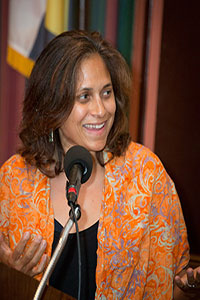What is curriculum and instruction for social justice?

What do we learn?
I am often asked exactly what our students in the curriculum and instruction for social justice program do, and my response is typically that we work with seasoned, passionate educators to deepen their understandings about the contexts of education, to include its history, and models and theories of curriculum and instruction. We do this using a social justice lens. In other words, we ask our students to look at past and present educational policies and practices in which some students thrive, while others do not, and we ask why? As an example, in a foundational curriculum and instruction class, we ask the question “what’s the purpose of education?” I bring up the fact that the students probably had to answer this question when they were freshmen in college studying education for the first time, but I remind them that it’s an important question for teachers to periodically re-visit. In another class, “Power, Identity and Intersectionalities in Education,” we recently discussed the dominant myth of meritocracy in US society and the ways that schools perpetuate this ideal. In other words, we talk about how simply working hard is not and never has truly been a guarantee that an individual will rise to the top of either an economic ladder or obtain a higher social status. Simply put, we have critical conversations centered on who has power in our society and who does not, and the implications for education. In today’s society, we believe it becomes more important than ever for ALL students to have critical conversations about issues of equity and justice, regardless of their communities. In Loyola University Maryland’s curriculum and instruction for social justice Master of Arts program, we aim to navigate through the various ways to enter into dialogue about justice issues across the curriculum for a variety of communities.
Who are our students?
Fortunately, in our CISJ classes, Baltimore city public school teachers sit alongside county district teachers, Catholic school educators and independent school teachers, not to mention a smattering of other educationists. Adults with varied experiences enrich our graduate school classroom dialogue so that we are never comfortable seeing that concepts are easily inserted into any classroom in the exact same way. But what we do walk away with as a common denominator is the importance of empathy and care for whole person, or cura personalis, a Jesuit education ideal.
Why is this program necessary?
In today’s world, I feel that this common, humanistic approach is more important than ever, especially after seeing the release of a new UCLA study “Teaching and Learning in the Age of Trump: Increasing Stress and Hostility in America’s High Schools.” In our CISJ classes, we discuss the ways in which having discussions about meritocracy or social reproduction theory, racism, classism, etc. with students in schools today can be had in one way among urban students, so that they might find these ideas most inspiring for themselves, and inspirational in a way that might lead them to become social justice leaders, but the conversation and approaches are rather different for our elite independent school students. It can be easy to ignore the uniqueness and range of contexts, but we serve ALL teachers and their students, and as of late, I am feeling that differentiating for different educational contexts to help them teach about equity concepts most effectively, is more important today than ever. And in fact, if we think about how to effectively teach a more privileged population how to become enlightened and inspired with cura personalis in the forefront of our minds, those privileged students might also one day become social justice leaders behind or alongside their urban peers. And so, the purpose of education question here at Loyola might look different for different teachers, but a commonality we aspire to includes teaching for a pursuit of social justice.
Dr. Stephanie Flores-Koulish is an associate professor and the director of the curriculum and instruction for social justice program in the School of Education at Loyola University Maryland.